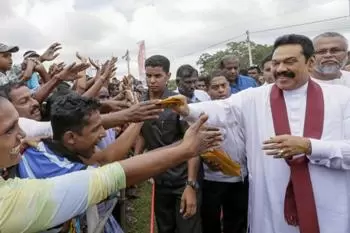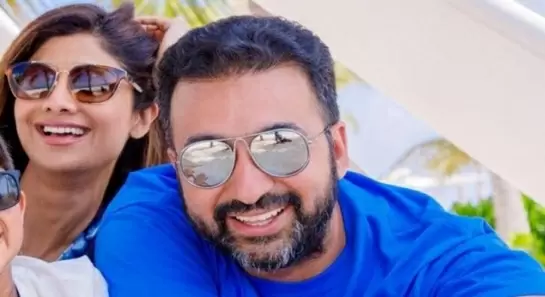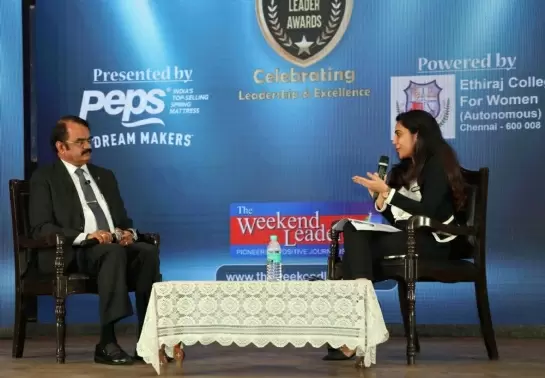A cell in The Hague, the nightmare for Colombo's rulers

09-January-2015

The transformation of Maithripala Sirisena in the past two months ranks among the most successful election make-overs in modern history. By the time Sri Lanka went to the polls this week, Sirisena had undergone a change that would have been envied by the most skilled Hollywood make-up artist.
The face of complicity in a brutal, corrupt, intransigent executive dictatorship had morphed into the face of compassionate, egalitarian reform.
 |
|
Sirisena, like his predecessor Rajapaksa (seen in photo on extreme right, during recent election campaign), does not want an international probe on war crimes (Photo: IANS)
|
Bitter experience over 45 years as a journalist has taught me to expect almost anything in the world of political opportunism but I was still taken by the way this man could leap the ditch with such calculated calm, land on his feet rather than his backside, and begin immediately the job of trashing everything he’d supported so wholeheartedly for so long.
Well, almost everything. And this is the point now for those who have been seduced – both in Sri Lanka and beyond -- by the sudden appearance of this new alluring face in the presidential office in Colombo.
When the mask inevitably fades, what will be revealed? How far will this supposed reformer go to reform a country that lives in desperate denial about its dark past and present, and its ever-growing international reputation as a perpetrator of genocide?
The answer can be found in Sirisena’s election manifesto, where you can search until you are blue in the face but find not one mention of the most critical issue in this island nation, the oppression of the Tamils in their traditional homelands.
If you need evidence of the denial that runs deep in the majority Sinhalese population it’s there for all to see - when a presidential election campaign can run its entire course without anyone mentioning the great, big elephant sitting over in the corner.
Given the contemptuous manner with which politicians treat pre-election promises, you might have thought that they would have had some discussion of the issue that goes to the heart of this country’s long-term well-being. Yet even knowing they could ditch any hint of a commitment once in office, there wasn’t the slightest inclination to talk about it.
Thus, Sirisena opted for some reassuring motherhood statements about compassion, human rights and inclusiveness and fighting corruption and nepotism. (Name the last political hopeful to declare he was dead against compassion, human rights and inclusiveness, and all for corruption and nepotism).
He is able to do this, only because most of the country long ago learned to avert its eyes to the Tamil genocide, while those few independent Sinhalese souls who want to know the truth can’t get it because of a media that either sits at the keyboard each day with fear on its shoulder– and thus descends into self-censorship -- or is content to exist in a world of unashamed adoration of presidential power.
The truth is that Sirisena has no interest in solving the Tamil question, and is more than likely to continue down the same beaten path of his predecessor, perhaps with slightly less tub-thumping vehemence of the once-revered war-ending president.
This means that the central current issue of the UN war crimes investigation into the slaughter of up to 70,000 innocent Tamil civilians will receive the same blathering nationalistic rejection as Rajapaksa applied to it, from the moment he declared in 2009 that, despite the 70,000 or so dead bodies lying in the sands of Mullivaikal, his military had completed a humanitarian mission with zero casualty.
Sirisena cannot go anywhere near the truth of this issue because he knows that we all know he’s up to his neck in it. As acting minister of defence, including during the closing weeks of the war, he sat high in the command structure, and thus in culpability for war crimes and crimes against humanity.
So who could be surprised when he declared he will continue Rajapaksa’s policy of blocking the war crimes investigators? Understandably, he shares with his predecessor a recurrent nightmare about ending up in a cell in The Hague.
Self-preservation is the most powerful motivation of all, not least in politics, and so Sirisena will do everything he can to stop any move to take Rajapaksa to the International Criminal Court, if the UN finds the ex-president guilty of war crimes.
Getting a case there would be difficult in any case, given that for a UN Human Rights Council finding to reach the ICC prosecutor it generally has to be recommended by the UN Security Council, where, because of geo-political interests, the veto powers of China, Russia and, probably the UK, would stop it dead in its tracks.
Once in office, Sirisena’s plan will be to obfuscate, falsify, misrepresent and straight-out lie, hopefully for long enough for people to forget that he, as much as Rajapaksa, has the blood of 70,000 Tamils on his hands. He’s had a good teacher, so it shouldn’t be too hard.
Of course, there is an alternative. He could begin to show he means what he says about compassion, human rights etc, and start his six-year term by ending the vicious military occupation in the north and east, which has been used by Rajapaksa to perpetuate the genocide against the Tamil population.
Then he could end the theft of Tamil land by the military and Sinhalese settlers, the destruction of Tamil temples and war graves, the disappearance of Tamil men and boys, the rape of Tamil war widows, and little girls, by soldiers who have operated with total impunity under Rajapaksa. And he could conclude by allowing Tamils their inalienable right to self-determination.
But then you’d have a fair and equitable world in which Tamils are seen as deserving as any other group of people, and this concept simply does not exist in the mind of any Sinhalese chauvinist, even one who seems as benign as Maithripala Sirisena.
Trevor Grant is the Author of “Sri Lanka’s Secrets, How The Rajapaksa Regime Gets Away With Murder” (Monash University Publishing, Australia)
IIM Grad and First-Generation Entrepreneur Anish Popli's ProcMart Secures Rs 250 Crore in Series B Funding
First Indian Space Tourist Talks Dreams and Inspiration Before Blue Origin Flight
Former MLA Rathod Bapu Rao Switches from BJP to Congress in Telangana
Zerodha Co-Founder Nikhil Kamath Launches 'WTFund' to Support Young Entrepreneurs
Firing At Salman Khan’s Mumbai Residence: Delhi Police Launch Probe








